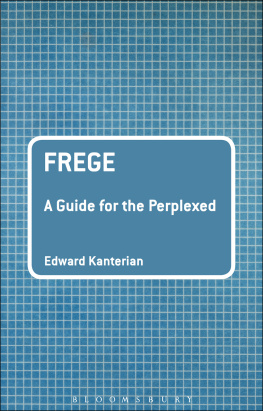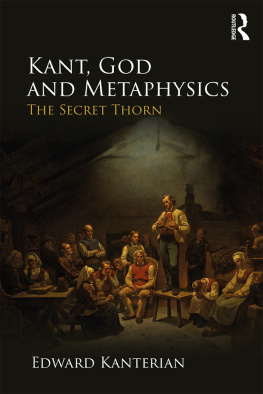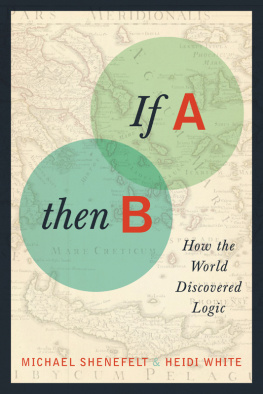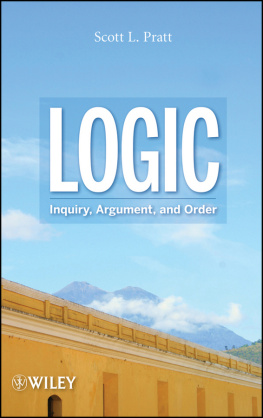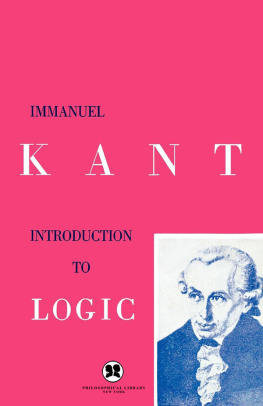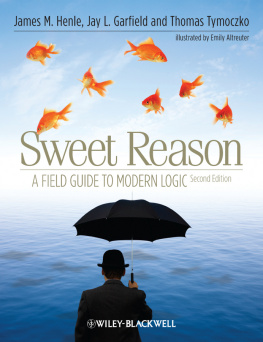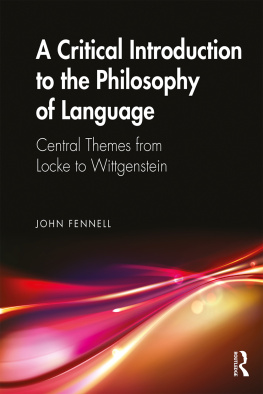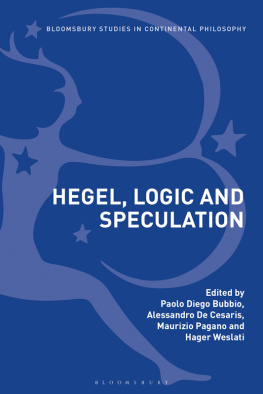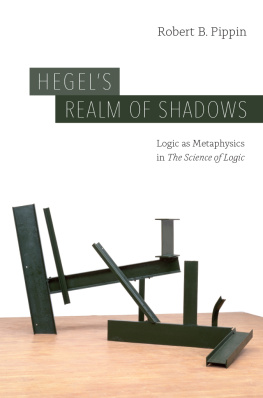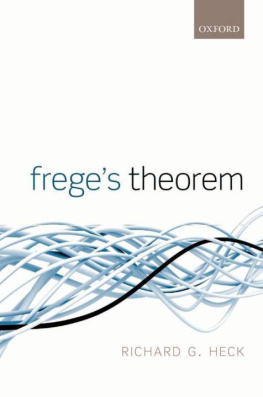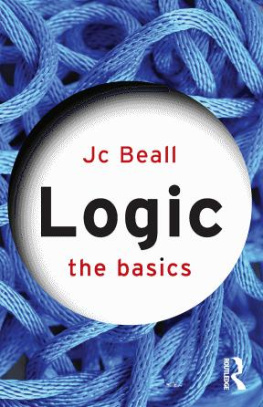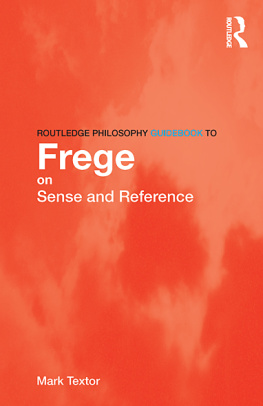Frege
Bloomsbury Guides for the Perplexed
Bloomsburys Guides for the Perplexed are clear, concise and accessible introductions to thinkers, writers and subjects that students and readers can find especially challenging. Concentrating specifically on what it is that makes the subject difficult to grasp, these books explain and explore key themes and ideas, guiding the reader towards a thorough understanding of demanding material.
Guides for the Perplexed available from Bloomsbury:
Adorno: A Guide for the Perplexed , Alex Thomson
Aquinas: A Guide for the Perplexed , Pater S. Eardley and Carl N. Still
Arendt: A Guide for the Perplexed , Karin Fry
Aristotle: A Guide for the Perplexed , John Vella
Augustine: A Guide for the Perplexed , James Wetzel
Bentham: A Guide for the Perplexed , Philip Schofield
Berkeley: A Guide for the Perplexed , Talia Bettcher
Deleuze: A Guide for the Perplexed , Claire Colebrook
Derrida: A Guide for the Perplexed , Julian Wolfreys
Descartes: A Guide for the Perplexed , Justin Skirry
The Empiricists: A Guide for the Perplexed , Laurence Carlin
Existentialism: A Guide for the Perplexed, Stephen Earnshaw
Freud: A Guide for the Perplexed , Celine Surprenant
Gadamer: A Guide for the Perplexed , Chris Lawn
Habermas: A Guide for the Perplexed , Lasse Thomassen
Hegel: A Guide for the Perplexed , David James
Heidegger: A Guide for the Perplexed , David Cerbone
Hobbes: A Guide for the Perplexed , Stephen J. Finn
Hume: A Guide for the Perplexed , Angela Coventry
Husserl: A Guide for the Perplexed , Matheson Russell
Kant: A Guide for the Perplexed , TK Seung
Kierkegaard: A Guide for the Perplexed , Clare Carlisle
Leibniz: A Guide for the Perplexed , Franklin Perkins
Levinas: A Guide for the Perplexed , Benjamin C. Hutchens
Locke: A Guide for the Perplexed , Patricia Sheridan
Marx: A Guide for the Perplexed , John Sheed
Merleau-Ponty: A Guide for the Perplexed , Eric Matthews
Nietzsche: A Guide for the Perplexed , R. Kevin Hill
Plato: A Guide for the Perplexed , Gerald A. Press
Pragmatism: A Guide for the Perplexed , Robert B. Talisse and
Scott F. Aikin
Quine: A Guide for the Perplexed , Gary Kemp
Relativism: A Guide for the Perplexed , Timothy Mosteller
Ricoeur: A Guide for the Perplexed , David Pellauer
Rousseau: A Guide for the Perplexed , Matthew Simpson
Sartre: A Guide for the Perplexed , Gary Cox
Schopenhauer: A Guide for the Perplexed , R. Raj Singh
Socrates: A Guide for the Perplexed , Sara Ahbel-Rappe
Spinoza: A Guide for the Perplexed , Charles Jarrett
The Stoics: A Guide for the Perplexed , M. Andrew Holowchak
Utilitarianism: A Guide for the Perplexed , Krister Bykvist
Wittgenstein: A Guide for the Perplexed, Mark Addis
A GUIDE FOR THE PERPLEXED
Frege
EDWARD KANTERIAN

Bloomsbury Academic
An imprint of Bloomsbury Publishing Plc
50 Bedford Square | 1385 Broadway |
London | New York |
WC1B 3DP | NY 10018 |
UK | USA |
www.bloomsbury.com
Bloomsbury is a registered trade mark of Bloomsbury Publishing Plc
Edward Kanterian, 2012
Edward Kanterian has asserted his right under the Copyright,
Designs and Patents Act, 1988, to be identified as Author of this work.
All rights reserved. No part of this publication may be reproduced or transmitted in any form or by any means, electronic or mechanical, including photocopying, recording, or any information storage or retrieval system, without prior permission in writing from the publishers.
No responsibility for loss caused to any individual or organization acting on or refraining from action as a result of the material in this publication can be accepted by Bloomsbury or the author.
British Library Cataloguing-in-Publication Data
A catalogue record for this book is available from the British Library.
ISBN: HB: 978-0-8264-8763-6
PB: 978-0-8264-8764-3
ePUB: 978-1-4411-0292-8
ePDF: 978-1-4411-1631-4
Library of Congress Cataloging-in-Publication Data
A catalog record for this book is available from the Library of Congress
CONTENTS
Dedicated to the memory of Ana Cocerva
If our language were logically perfect, we would perhaps have no more need of logic, or we might read logic off from the language. (1915)
It was from mathematics that I started out. (1919)
Gottlob Frege (18481925) is considered the greatest logician since Aristotle and one of the most important philosophers of the modern period. As a philosopher, his main contributions were in the philosophy of logic, mathematics and language. He also touched, if marginally, upon issues in epistemology and philosophy of mind. His main focus was not philosophy, however. He was a mathematician by training, and his interest lay in setting mathematics, in particular arithmetic, on a firm scientific foundation, a task of great urgency in his time.
A cursory look at his works demonstrates this. Most of them deal with two topics. The first is mathematics. Here, the focus lies on arithmetic, its nature and logical reconstruction, with which his three books, Begriffsschrift ( Conceptual Notation , 1879), Grundlagen der Arithmetik ( Foundations of Arithmetic , 1884) and Grundgesetze der Arithmetik ( Basic Laws of Arithmetic , 2 volumes, 1893 and 1903) are concerned, as are numerous articles and drafts in his Nachlass . He also devoted several discussions to the foundations of geometry, for instance in his first dissertation and later in his criticism of David Hilbert.
The second major topic is logic, logic understood in the narrow sense of a formal language and calculus (conceptual notation, or concept-script , as it will be called here), and in the broader sense of a theory of truth, concepts, thoughts, judgements, inference and reason. This theory underlies the conception of Freges concept-script. The relation between these two topics, logic and mathematics, is initially one of tool versus object of study. The object of study is the essence of number and arithmetical truth, while the calculus is a tool designed specifically to accomplish this study in the most precise way possible. But in fact the relation between object and tool is more intimate.
Arithmetic is a discipline concerned with its peculiar truths, and to establish its scientific status, to know what numbers really are, is to know what precisely these truths are, i.e. what they are about and what is their ultimate justification. But logic is for Frege also a discipline concerned with its own truths. This raises the question concerning the relation between arithmetical truth and logical truth. Do they belong to the same family? Kants answer was yes and no. Yes because arithmetic and logic express a priori truths. No because arithmetic is synthetic, based on what Kant called pure intuition, while logic is analytic, expressing only purely formal relations between concepts, without any intuitive addition. But for Frege, arithmetic and logic do belong to the same family they both express a priori , analytic truths of the greatest generality, and share the same modes of inference (proof). In fact, they dont only belong to the same family, but arithmetic is a branch of logic. This is the doctrine of logicism , Freges most treasured idea, at least until he was confronted with Russells Paradox in 1902. He wrote early on, in the article On Formal Theories of Arithmetic (1885):
Next page
